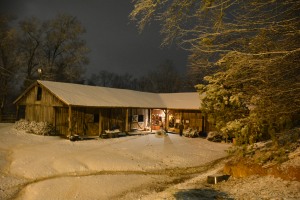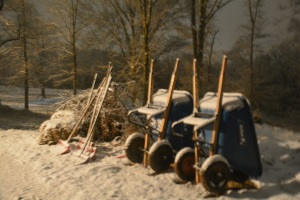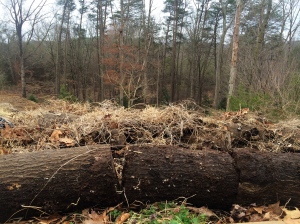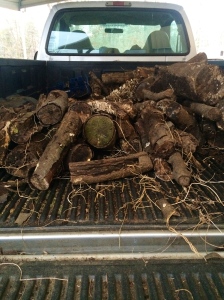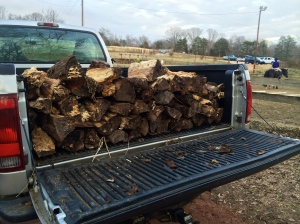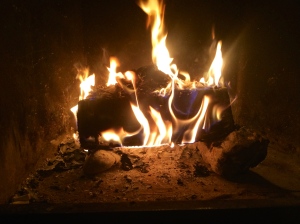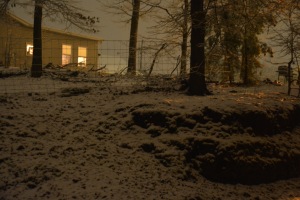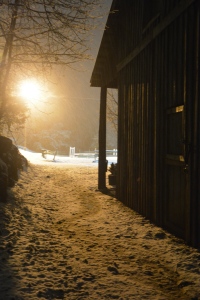I’ve worn the same belt for fifteen years, ever since I started teaching people how to ride horses. It’s thick and wide, unadorned, brown leather, the finish of the buckle worn off ages ago by sweat. I’ve alternated between three different holes on the belt, weight fluctuating through happiness and stress, but the median hole, the balance spot, the fulcrum where I always return, is starting to wear. I know the tell-tale signs, like the stress on a stirrup leather; this belt is going to have to be replaced soon.
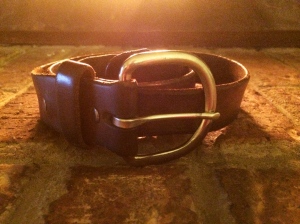 I paced the aisles of the Pickens Flea Market one frigid morning before Christmas. I found a man who did leather work, but his belts only came in one size, for men. I scored a leather shipping halter and some rope to tie rope halters, a nice heavy gauge for the leads, but I came back belt-less.
I paced the aisles of the Pickens Flea Market one frigid morning before Christmas. I found a man who did leather work, but his belts only came in one size, for men. I scored a leather shipping halter and some rope to tie rope halters, a nice heavy gauge for the leads, but I came back belt-less.
It’s when something is about to end, something comfortable and familiar, that I generally flip out and try something I’ve never attempted before. This belt reminds me of my grandfather; I don’t know why. Maybe he purchased it for me. Maybe I bought it on one of our many trips together. Did this belt come from the flea market outside Moscow? It could have. A mall in Canada? A shop in Washington state?
My grandfather was politically active and a successful businessman, but he always built his own fence and chopped his own firewood. If something needed to be done, he engineered a way to do it. His home was on the wooded side of an urban mountain and there was a routine to our Saturdays together. We’d drive to his office and open mail. We’d drive to his mother’s house to pay her bills. We’d eat lunch. He’d take me to my riding lesson. I’d come home and sneeze for three hours because I was/am allergic to horses and try to do something like put a saddle on Beau, the Labrador, while my grandfather chopped wood. In my memory, he is the scent of hardwood chips and woodsmoke, the stove he was so proud of on the ground floor of his house blazing us all out of doors. His stove burned too hot.
Perhaps he was hardening me for winter. I’d carry the smaller pieces of wood for him, splinters in my hands because I was always losing my gloves. He was humming, always humming, beneath his breath, the thick cotton canvas of his overalls, a mirror of the ones I don now when the weather dips below freezing.
My grandfather, like me, made a lot of mistakes out of pride, but he was genuinely proud when I decided to go into horses full-time, years later. My last months with him were spent driving around the county looking for land, scouring the real estate listings, talking to builders about the best spot to erect a barn. Should the riding ring go there, beneath the oaks?
I found a soft landing from the pain of my grandfather’s sudden and swift diagnosis of bone cancer when the owners of Foxcroft generously offered a home for my horses and the program that would go through many incarnations as Bramblewood. I go for long drives on Saturday afternoons in my grandfather’s memory. I gaze at fields at sunset. I ask him questions. I tell him my plans. In the legacy of countless southern farmer’s superstitions, I take wild things as answers: the sudden appearance of a crow, a break in the clouds, the way the mountains emerge suddenly at the horizon of treetops past a bend in the road. I take these things as Yes or No, my magic eight-ball of the landscape.
I am grateful beyond measure to have the ability to keep horses and cultivate our extended family of riders on this land. I mourn the passing of so many things when I see another field turned into houses, but I know there are people moving into those houses that will one day join us and ride horses. The cycle continues as we carve out our forests of peace, whatever they are.
But this was supposed to be about belts and firewood.
There are certain tasks I have always done for myself and others that I have waited for others to do for me. Firewood is one of the latter. Chainsaws mystify and terrify me. I’ve asked a dozen people to teach me how to use one, and one day I’ll take them up on their generosity. An axe, I can swing. I can drive a wedge. I’m really good at wedges.
Fed up with ice and snow and rain, and just a little crazed from the cabin fever that hit after three weeks of weather, I stared at the massive, rotted oak that had been felled by professionals a few years ago. It rested on the spot beside the barn where I used to grow vegetables. I missed having a garden, running the dirt through my fingers and obsessively plucking weeds. The oak was three foot in diameter, larger at the hollowed base. The stump would make a great breakfast table if we were taken with the spirit to throw a mad hatter party in the dog days of summer, delicate sandwiches and salads from the bounty of my now-defunct garden. Something had to be done. The fallen tree had to be moved.
I texted the last person who had handled the splitting maul. “Try the shed,” they said. So, I did.
I started with the delicate logs left over from the tips of the oak branches. With a wheel barrow, I carted the logs to my truck. The tree guys had left the remnants in fireplace-sized chunks. The ones I could lift, I moved, the ones I could not, I rolled to form a rudimentary perimeter around the garden space. All the others, I split.
I found earthworms and grubs and ants, but the heart of the wood was solid and as a wise cowboy named Bud told me, “If it’s wood, you can burn it.”
I Googled “splitting wood” and changed my form.
I Googled “wood suitable to burn” and found a hundred different opinions, but decided that Bud knew best.
I stopped Googling and turned off my phone.
Then I set to work.
I tested my aim with a soft dive of the axe-head to the wood. I used the larger logs as chopping blocks. I let the tool do the work, lifting straight up and dropping rather than swinging behind my back and letting it fall as it would.
Ninety-eight percent of the time (we like averages) the splitter barged to the right or left and either missed entirely or lobbed off a piece of bark. The other two percent won me over, splitting the wood down the center with a single swing. I decided that firewood was a metaphor for everything and decided to write a blog post.
A post that ended up, somehow, starting with my belt and then my grandfather, my continuous secret shadow. I had forgotten how much the scent of split wood reminded me of him. I hummed while I moved and discovered the bone-deep satisfaction of physical work, the therapy that had brought me to farms in the first place, that ten year old girl with splinters in her fingers, a nose that wouldn’t quit running and thighs that ached from learning to post the trot. The one that put a saddle on the Labrador. The one that watched her grandfather build fence when he could have hired any number of people to do it for him.
With each load of logs I placed on my truck, I gained a little more faith in the fact that I could find the answers for myself, with enough time. I could figure it out.
One day I’ll own it, I’ll know it. But for now I’ll just scour the woods for fallen oaks and repurpose them into warmth. I’ll scavenge the woods for blackberries in the summer. I’ll grow ginseng and goldenseal and use them to tend my bruises. I will run the dirt through my fingers and feast on the harvest of the soil. I’ll stare at the dwindling light on the fields and ask my grandfather if this is good work.
When the crow calls, I’ll have my answer. Until then, I’ll search for a new belt, tightening the old one until it finds the end of its use. I will burn the fallen tree, tossing the junk mail to fuel the embers, collect the wood ash and return it to the garden.
Slowly, slowly, I will learn how to grow. The farm will point the way and I will follow. Or in the words of Rumi: “Let the beauty we love be what we do, there are hundreds of ways to kneel and kiss the ground.”
